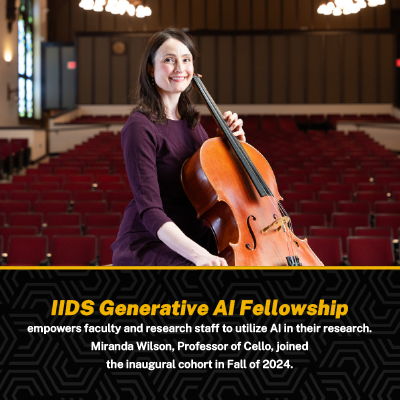
IIDS Generative AI Fellowship Program
February 24, 2025In Fall 2024, the Institute for Interdisciplinary Data Science (IIDS) launched the Generative AI Fellowship Program, a one-semester opportunity designed to empower faculty and research staff to incorporate generative AI into their research. The program offers tailored project support from IIDS experts, fostering interdisciplinary collaboration and innovation. Open to participants at all levels of AI proficiency—whether you're an experienced coder or just beginning to explore AI tools—this fellowship provides an opportunity to enhance your research by leveraging generative AI technology. At the conclusion of the fellowship, participants showcase their work in a research presentation, highlighting how generative AI has enhanced their projects.
The Fall 2024 cohort brought together researchers from across the campus, representing multiple diverse disciplines. Their final presentations were recorded and can be viewed on the IIDS YouTube channel.
University of Idaho has highlighted one of these first researchers, Miranda Wilson, Professor of Cello, in a recent news feature. Read more about Dr. Wilson's Generative AI Fellowship Program project at uidaho.edu/news and learn how generative AI was leveraged to translate a century old German text.
Fall 2024 Cohort Researchers
Dr. Miranda Wilson, Professor of Cello, College of Letters, Arts, and Social Sciences
Breaking Language Barriers in Cello Pedagogy with AI-Assisted Translation
This presentation explores the use of advanced AI-assisted translation to make the German cellist Hugo Becker's groundbreaking research, Mechanik und Aesthetik des Violoncellspiels, accessible to English-speaking cellists and teachers.
Dr. Tyler Bland, Clinical Assistant Professor, Idaho WWAMI Medical Education Program
Alien: Parasites Within – A Multimodal Generative AI Approach to Developing a Short Film
This presentation explores the creation and educational impact of the short film "Alien: Parasites Within," which builds upon the thematic elements of the existing Alien horror franchise to teach about antimalarial medications.
Dr. Jaslam Poolakkal, Research Scientist II, College of Natural Resources
Decoding Forests: AI-Driven Tree Segmentation for Sustainable Forest Management
Advancing forest management requires precise insights into forest structure, which begins with accurate individual tree identification. This research combines state-of-the-art deep learning models, to segment and classify forest LiDAR point clouds.This approach facilitates more detailed forest inventories, improves resource monitoring, and supports climate-smart forestry practices.
Dr. Oleksandr (Alex) Tsaruk, Assistant Professor of Management, College of Business and Economics
AI-Tuned Analysis of CEO Risk-Taking and Organizational Misconduct: A Rational Choice View
The relationship between CEO risk-taking and organizational misconduct is a critical area of study in management and organizational behavior. This study investigates the relationship between CEO risk-taking incentives and organizational misconduct through the lenses of agency and rational choice theories. We test our predictions based on CEO risk incentives and AI-tuned coding of instances of organizational misconduct. We illustrate the value of AI fine-tuning techniques to code instances of organizational misconduct and describe the basic steps in this process.
Looking Ahead: Spring 2025 Cohort
The Spring 2025 cohort is now embarking on their projects, with their presentations scheduled as part of the IIDS Seminar Series. These sessions will be held at 12:30 PM on April 24, May 1, and May 8. Please stay tuned for further announcements, including detailed information on the topics and speakers for each session.
If you're not currently subscribed to the IIDS listserv and would like to receive updates about upcoming events and fellowship opportunities, please contact us at iids@uidaho.edu to be added to our mailing list.
Michelle Reagan
IIDS Scientific Design and Communications Specialist
Photo by Chris Giamo and Garrett Britton, University Visual Productions.